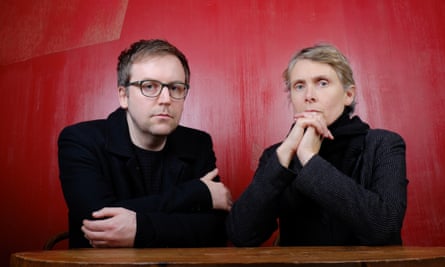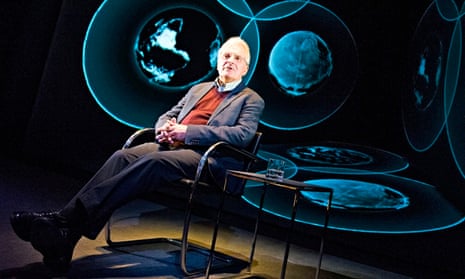Other theatres investigate the past: the Royal Court is taking on the task of examining the future. After Ten Billion, in which Stephen Emmott explored the catastrophic consequences of over-population, we now have this monologue by Chris Rapley, co-written with dramatist Duncan Macmillan, which looks at the outcome of mankind’s dependence on fossil fuels that create greenhouse gases. If Rapley’s talk is less doom-laden than Emmott’s, it nonetheless sends you out of the theatre in a state of heightened concern.
Some will argue this is not really theatre. But the idea that theatre should be exclusively reserved for fiction has been knocked on the head by a surge of documentary dramas and verbatim plays. And Katie Mitchell, who directed both this show and Ten Billion, realises that the eye needs to be satisfied as well as the ear. Rapley sits in a chair and, without notes, talks to the audience with an astonishing calm and command of facts for 75 minutes. Meanwhile Chloe Lamford’s design presents us with swirling video images behind him that illustrate Rapley’s arguments and have a strange beauty of their own.
Much of the power of Rapley’s talk stems from his personal investment in the subject. He describes how, as a boy, he was fascinated by maps of Antarctica depicting “regions unknown to man”. This led him towards a distinguished career in which he has been, among many other things, director of the British Antarctic Survey and the Science Museum. He also explains that the title of his talk stems from the fact that his grand-daughter will be his current age in 2071 and that he wants her to inherit an inhabitable planet.
Rapley admits that climate change is “an emotive issue”, but he relies on hard scientific evidence to make his points. He starts with a broad geophysical survey of our planet, and then homes in on specifics about where we are today. As a result of 90% of the world’s glaciers and ice caps retreating, sea levels will inevitably rise; and this, he points out, affects the climatic equilibrium which is the basis of modern civilisation.

Rapley proceeds by rationally accumulating the facts. But periodically he comes out with disturbing general statements. Explaining how the atmosphere is warmer because the global carbon cycle has been disrupted, he tells us that “we are the first human beings to breathe this level of carbon dioxide”. And, in a clear rebuke to climate-change deniers, he warns: “All the warming that is occurring is due to us.” He also leaves us in no doubt as to the urgency of the situation.
A global temperature-rise of 2C is the “guard rail” beyond which lies disaster. If we are to avoid that, says Rapley, “it will require the greatest collective action in history.”
The facts are sombre. But, where Emmott’s Ten Billion ended with the words “I think we’re fucked”, Rapley believes that human ingenuity is unbounded.
Outlining possible solutions to the crisis, he suggests there is little we can do about escalating population and the global economy. He pins his faith in greater energy efficiency and a growing dependence on renewables such as wind farms and solar power. He points out China and India are already massively investing in wind farms, but he is too polite to attack Britain’s blinkered resistance to such an obvious, economically viable source of energy.
My only complaint about the evening is that no printed text is available: a pity, since there is a mass of information to digest at a single hearing. But Professor Rapley’s talk is compelling, forensic in its approach and based on scientific data rather than heated emotion. For all I know, he may be addressing the converted.
But I suspect even the most obdurate, climate-change denier would have to admit to the logic of the case he presents. And, if we look to theatre to increase our awareness of the human condition, the evening succeeds on all counts. A lot of theatre provides optional pleasure. This talk, which deserves wide dissemination, is better than good: it is necessary.
Until 15 November. Box office: 020- 7565 5000. Venue: Royal Court theatre
More theatre coverage
Maxine Peake’s Hamlet to be screened in cinemas
Made in Dagenham review – brassy Gemma Arterton musical lacks passion
David Edgar: ‘Ukip is my territory. I suspect I am going to write about that’
Miriam Margolyes: ‘I do say things possibly other people don’t say’

Comments (…)
Sign in or create your Guardian account to join the discussion